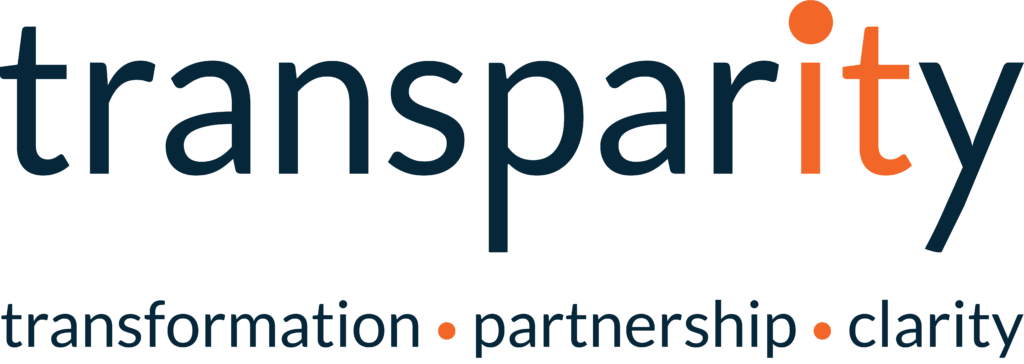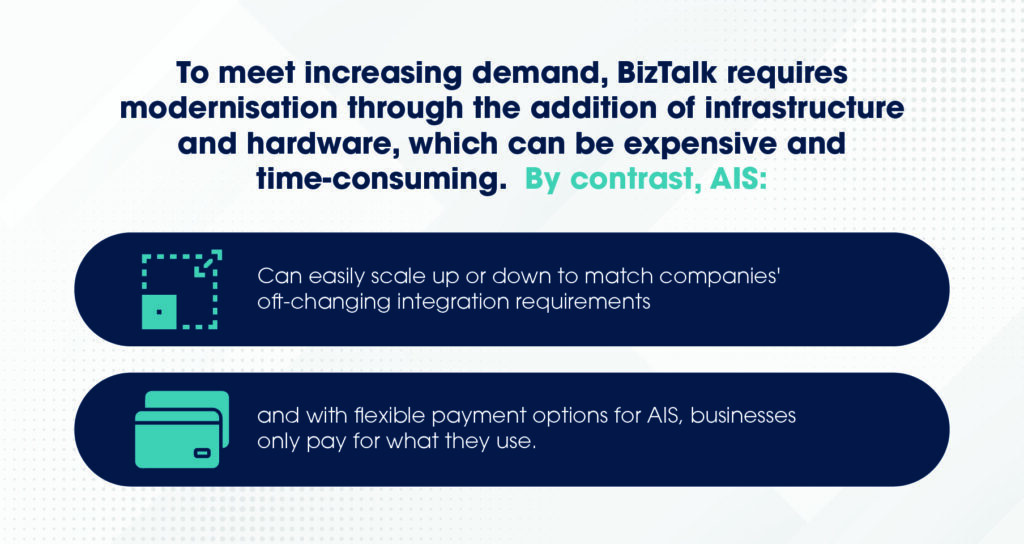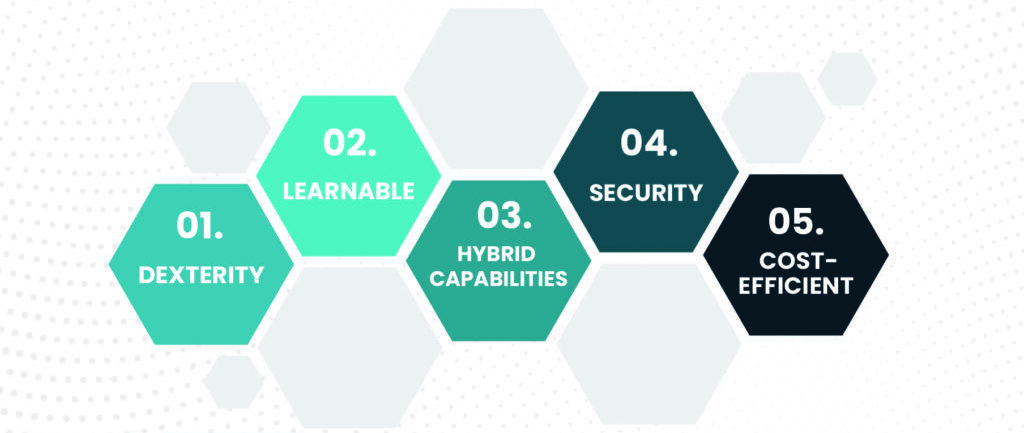For now, Microsoft BizTalk Server remains a viable option for on-premises application integration at the enterprise level. It facilitates numerous functions that allow organisations to build, deploy, and manage their application and system connectivity. But at this point, can we still say that BizTalk can, more or less, do everything on-premises that Azure Integration Services (AIS) does in the cloud?
To be fair, the answer isn’t a straightforward yes or no. Cloud environments are fundamentally different from on-premises infrastructure, which inherently complicates any attempt at a one-to-one comparison between BizTalk and AIS. But at the same time, it must be said that AIS offers certain capabilities that are simply beyond the capacity of BizTalk.
IS BIZTALK OUTDATED?
Released in 2000, BizTalk is one of the few older integration technologies that is still utilised fairly widely to this day. It’s capable of streamlining on-premises operations by connecting systems and applications such as SAP S/4HANA, Sage CRM and Salesforce.
However, despite notable updates and enhancements in its latest (2020) edition, BizTalk can’t support the most up-to-date Microsoft services and capabilities. (Simply think of how much has changed in tech overall, especially in the cloud, between 2020 and 2023 alone.) As such, BizTalk might not be the best option for today’s businesses when taking other modern digital architectures into consideration.
The cloud-based services of AIS enable application, data and system integration for businesses’ most critical resources. Also, if using the appropriate data gateway and connectors, some AIS tools can connect to on-premises data sources, partially bridging the gap between the two infrastructure worlds. Almost due to this fact alone, AIS solutions are much more flexible and scalable than those within BizTalk Server.
To meet increasing demand, BizTalk requires modernisation through the addition of infrastructure and hardware, which can be expensive and time-consuming. By contrast, AIS can easily scale up or down to match companies’ oft-changing integration requirements, and with flexible payment options for AIS, businesses only pay for what they use.
BIZTALK VS. AZURE INTEGRATION SERVICES
If looking to directly compare BizTalk to AIS, the best way to do so is by examining certain essential business technology needs and addressing how they are met by both the former and the latter. Below are five factors to assess:
1. APPLICATION MANAGEMENT
BizTalk: The platform for application administration is called The BizTalk Administration Console, a Microsoft Management Console (MMC) application. This contains a console tree, which facilitates access to folders and subfolders that represent different types of artefacts.
AIS: Application interfaces are managed and monitored through the Azure portal, allowing users to remain ever cognizant of app health or performance issues. With features such as run history transaction traces available in the portal interface for Azure Logic Apps, this allows you to have more efficient — and granular — insight into apps and Azure resources than BizTalk allows for its resources.
2. BUSINESS PROCESSES
BizTalk: Orchestrations are executable business processes that use publish-subscribe messaging through the MessageBox databox. Using a subscription and routing infrastructure, they can construct new messages and receive messages. BizTalk offers direct ports in orchestrations which put messages directly in the message box to be processed elsewhere.
AIS: Using a building-block approach, businesses can form executable processes with pre-built operations from a vast array of connectors, simplifying integration with ready-made solutions. Easy-to-understand design tools mean minimal code is required for the implementation of patterns and workflows. Also, AIS’ serverless capabilities make it even more scalable and adaptable.
3. APPLICATION CONNECTIVITY
BizTalk: Adapters run locally on BizTalk Server with dozens of out-of-the-box adapters and a small collection of available ISV adapters. Adapters use a message-oriented messaging pattern where systems exchange complete messages. These systems are responsible for parsing data before loading it into the final data store.
AIS: Tools such as Azure Service Bus and Event Grid facilitate app connectivity in terms of messaging-based data transfer and event-driven integration, respectively. Meanwhile, Azure API Management provides a unified view — and comprehensive oversight — of on-premises and cloud APIs, including those hosted on non-Microsoft clouds in an enterprise multi-cloud architecture. This facilitates a better flow of app traffic across all API deployments.
4. BLOCK ADAPTER USAGE
BizTalk: The concept of blocking certain adapters from specific applications doesn’t exist in BizTalk Server. Instead, users must manually remove adapters from the environment. It’s also possible to define receive and send handlers for individual adapters, assigning computer authorisation to execute or process those handlers.
AIS: Azure Logic Apps enables users to block connections in your logic app workflows if this is necessary for security or other reasons. Use Azure Policy to define and enforce guidelines that prevent unauthorised connections to systems and services you wish to block.
5. SECURITY AND GOVERNANCE
BizTalk: Encrypted information is stored in the Enterprise Single Sign-On (SSO) database, where it can be stored, mapped and transmitted by adapters. BizTalk has two main administrative groups, the administrators group and the operators group — and both experience issues with system accessibility due to Microsoft’s predetermined roles. To overcome limitations, custom profiles have to be created to access the appropriate systems.
AIS: Azure has several security methods in place to protect sensitive data. The first is Azure Key Vault, which stores API keys, credentials, secrets and certificates — and is only accessible through the Azure Key Vault Connector. The second is the managed identity option, which is available across numerous AIS resources and allows users to prevent access to anyone who doesn’t have an authorised managed ID store within Azure Active Directory.
GENERAL AIS ADVANTAGES
AIS is ideal for integration due to the plethora of cutting-edge solutions it puts at your fingertips to improve workflows and facilitate better app and system connectivity. Having compared these modern services to BizTalk, let’s evaluate the key takeaway benefits of AIS:
DEXTERITY
Providing a wide selection of APIs, templates and pre-built connectors, AIS allows organisations to integrate their applications and systems efficiently. This saves time and money by averting the need to build infrastructures from scratch.
LEARNABLE
With the payment models available, businesses can slowly build and expand their resources, facilitating a learning environment that makes these systems digestible for newly acquainted developers. Meanwhile, more experienced developers can utilise familiar tools such as Visual Studio or ASP.NET, as well as common programming languages (e.g., C# and Python).
HYBRID CAPABILITIES
The hybrid capabilities of AIS allow for seamless mobility and consistent cloud deployment. Additionally, they give users access to a diverse range of hybrid cloud connections, such as caches, VPNs (virtual private networks) and CDNs (content delivery networks).
SECURITY
When Microsoft designed Azure, it made sure to focus and base this on the industry-leading security development lifestyle (SDL) process, ensuring a secure system for integration. Also, with 50+ compliance offerings, Microsoft Azure has proven itself as one of the best cloud platforms for compliance coverage.
COST-EFFICIENT
The previously mentioned pay-for-what-you-use flexibility of AIS makes its services incredibly cost-efficient when set up correctly. Businesses can scale areas in bite-size chunks as needs dictate, instead of having to completely reinvest in new infrastructure. With Azure’s cloud capabilities and presence in 42 regions, businesses can easily tap into new markets without additional costs.
STEP INTO MIGRATION
If you’re a loyal BizTalk customer, take the time to consider the best solution for your business by weighing out the benefits of each infrastructure. Whether you’re looking to experiment with AIS integration or update your on-premises BizTalk system, the experts at Transparity are on-hand to help.
Get in touch with us today to discuss your infrastructure’s potential and find a solution that works for you.






